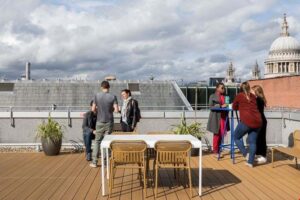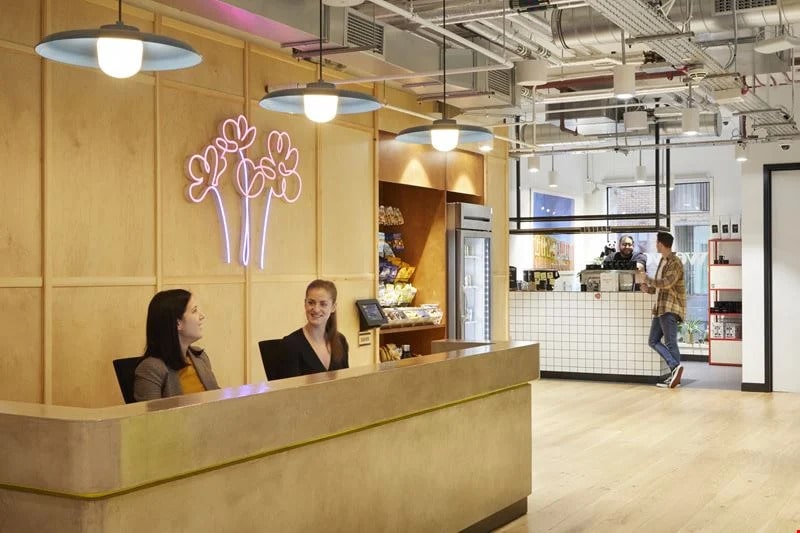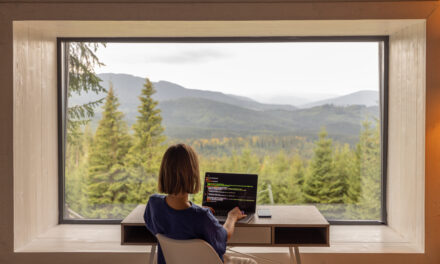It was November 2020 when we started The Hush Collaborative on the down low. Each of us was working a full-time gig from home, which gave us all the chance to turn passing comments about starting our own thing into building our own thing. The pandemic and the massive shift in how we were working allowed us to stop dreaming about how to do things differently and actually design them.
And we were not alone, for the record. The number of independent workers (entrepreneurs, solopreneurs, freelancers, gig workers, etc.) increased by 89% between 2020 and 2023*. The pandemic was a forcing function in multiple ways, causing everyone to adjust and adapt to living in lockdown. Our newfound flexibility enabled us to experiment in ways we never had before. It was exhilarating and freeing.
And yet, it was also unmooring. We were a captive audience with a front-row seat as the systems we all rely on came into the light, warts and all: healthcare, education, the economy, and the apparatus that underpins work.
We are so grateful to and for the folks with the skills and desire to create systems change in other areas. As women and recovering ex-agency leaders, we knew our focus was to change how we work and, more specifically, how businesses get strategic work done.
The lived and shared professional experiences connected us to this mission, including disrespect, disillusionment, and disappointment. We were tired of watching clients and colleagues struggle to implement strategies we had spent months and sometimes years creating. We were done with leadership teams constantly moving the goalposts and then asking for more. We were fed up with self-made fire drills and self-sabotaging timelines. We were gutted by the way our gender was so clearly weaponized. Starting a business together in 2020 only strengthened and scaled our commitment to change how we work, not just for ourselves but for everyone we work with or for.
Guided by the idea that growth and comfort do not coexist—we set out to answer questions like, can we design workflows where sharing feelings is good? How do we cultivate power-sharing as a leadership quality? What listening and learning moments do we need to incorporate regularly? What role can authority play other than dictator or absolutist? How can meetings be more meaningful? Can we build community at work, no matter where we are working?

We are four years into this business, and the list of questions has gotten longer. Why? Because we are seeing success in every single one of our partnerships. We are finding leaders and collaborators who believe doing things differently is our only option. We have designed multiple ways of effectively moving organizations through change. When you connect people, operations, and strategy, growth becomes inevitable.
If we have learned anything, and there is still much to learn, we know that we can do business and succeed in ways that are antithetical to what we’ve experienced. This applies to when we go into an office, when we are virtual, and most importantly, when we do both. For example:
- People are more satisfied and productive in their work when they have autonomy.
- When given the proper tools and support, people know how to be agile and adapt.
- When given time and space to care for themselves, people show up with more to give.
- When the power to innovate is shared, the solutions get more innovative.
- People want to work together but do best when they can self-select the moments that matter most.
These are just a few of the nuggets we have gathered as we work with partners across the United States. The data suggests the future of work will focus more and more on the human experience. As the saying goes, what you focus on grows.
While hybrid work is here to stay, growth-oriented organizations still need to figure out how to create spaces where we can collaborate and create. People, especially high-performers, want them, and they want the companies they work for to create and cultivate them.
Human beings are wired for connection. It is a need like shelter, water, or air. It’s in our nature to invest ourselves and our efforts where we spend our time. Did you know you will spend ⅓ of your lifetime at work? It is roughly 90,000 hours, if you were wondering. We believe there are much better ways for us to work with that time. Don’t you?
____________________________
Sources:









